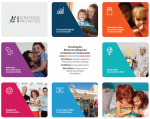To read more about the Jewish Federation of Greater Vancouver’s 2020 Strategic Priorities, visit jewishvancouver.com/2020.
An estimated 50% of Metro Vancouver’s Jewish community lives outside of the city of Vancouver. For young families with at least one Jewish parent, the proportion of Jews living outside of Vancouver jumps above 60%. Like other area residents, they are moving to the suburbs in the elusive search for affordable housing – and that search has taken them far away from the organizational centre of the community, at Oak Street and 41st Avenue.
In setting its 2020 Strategic Priorities, the Jewish Federation of Greater Vancouver addresses the challenge of an increasingly dispersed community, as well as that of an aging population. It also considers the fact that, while it is expensive to live in Metro Vancouver, it is even more expensive to be involved Jewishly.
Over the past two years, Federation has surveyed Jews both in Vancouver proper and outside of the city to find out what they consider to be the priorities of the community and where resources should be allocated. The Connect Me In online surveys reached more than 300 people in outlying areas, 200 of whom agreed to further conversations with Federation, according to Federation chief executive officer Ezra Shanken.
“We’ve had hundreds of conversations with groups and individuals,” Shanken told the Independent. “We wanted to know what areas are lacking. We also asked how should Federation feel and how does it feel? We heard that Federation and the Jewish community is not accessible enough.”
A look into the near future, the 2020 document highlights a number of key areas that have been identified for strategic investment. The report’s subtitle gives the clear message for the idea behind the plan: “Moving our Jewish Federation from Strength to Excellence,” and excellence requires more resources.
As the main fundraising organization of the Jewish community, Federation directs support not only to large, high-profile institutions like Jewish Family Service Agency and Vancouver Talmud Torah, but also to many smaller organizations for which it would be impossible to adequately fundraise independently. The dollars raised and then allocated by Federation are meant to ensure that its 40 constituent agencies are able to sustain a diverse, well-rounded Jewish community without the worry of constant fundraising.
With such a large number of organizations and a wide range of needs, every year the allocation process requires Federation to make difficult decisions. The 2020 plan is intended to identify current community needs, predict the amount of money needed to meet those needs and then raise the necessary funds. The identified priorities include both local and international obligations.
Locally, engaging the next generation, addressing new and evolving community needs, investing strategically in the community and closing the funding gap to meet ongoing needs are the priorities. Each area has a number of key issues embedded within it and all of the details are available on the Federation website. The breakdown of needs is laid out to include the current level of funding and what it covers, as well as the projected needs with their accompanying cost.
Federation’s international commitments include supporting a variety of projects in Israel and communities around the world. Shanken said he is often asked about the amount of money that leaves the local community.
“It used to be an 80:20 ratio of money going to Israel – UIA [United Israel Appeal] was set up to build Israel,” he explained. “Now, it’s more like 30:70 because the way we engage with Israel is very different. We have an Israel department here, we bring the Shinshin [Year-of-service] program to Vancouver for Israel engagement with our community and we fund the Gesher [Bridge] program that brings young Israelis here.”
He also noted that Federation facilitates the funding of some special projects in Israel, which are separate from Federation’s budget. The way these funds are directed is a result of the donor’s wish to feel a sense of ownership of their gift. However, cautioned Shanken, “The sense of ownership cannot replace the duty to help all agencies.”
Federation plans to continue strategically funding existing organizations, while putting in place some new programs. The Diamond Foundation recently gave seed money to bring in a part-time community developer to reach out to marginalized communities. Jewish education, services for seniors and other Jewish programming are among the ways Federation plans to “get out there,” according to Shanken. He offered as an example Federation’s PJ Library, which provides books with Jewish content to more than 1,000 Jewish children in the Lower Mainland.
To read more about Federation’s 2020 Strategic Priorities, go to jewishvancouver.com/2020 or join the conversion on social media, #ourcommunity2020.
This year’s annual campaign launches on Sept. 22, 7 p.m., at the Queen Elizabeth Theatre with FEDtalks, featuring author, radio host and founder of Zuckerberg Media, Randi Zuckerberg; Reut think thank founder Gidi Grinstein; One Clip at a Time co-founder Alison Lebovitz; and journalist Terry Glavin. For tickets and more information, visit jewishvancouver.com/fedtalks2016.
Michelle Dodek is a freelance writer living in Vancouver.





